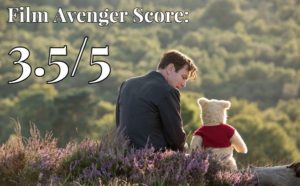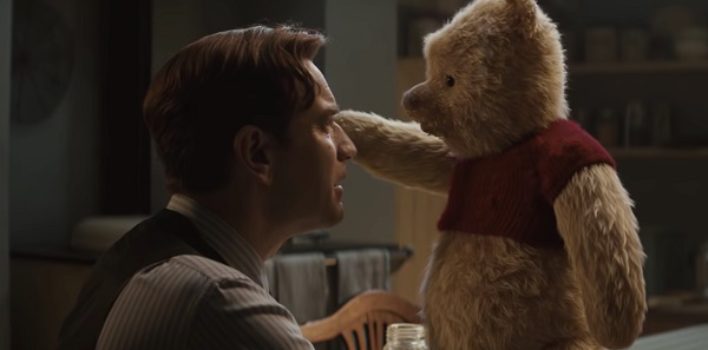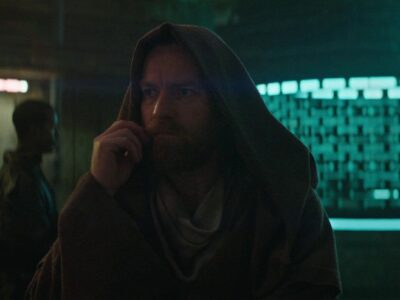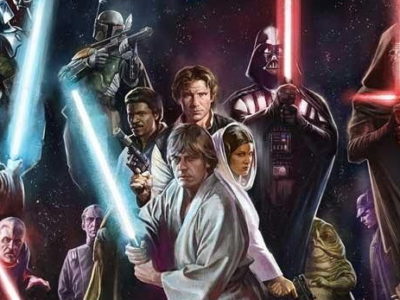Review| Christopher Robin – Doing “Nothing” is Something
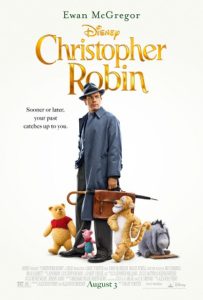 The Winnie the Pooh stories have been a source of delight for millions of children around the world since author and poet A.A. Milne published the first Pooh book in 1926. These stories are filled with a childhood whimsy and gentle humor that is very endearing and profound in its simplicity.
The Winnie the Pooh stories have been a source of delight for millions of children around the world since author and poet A.A. Milne published the first Pooh book in 1926. These stories are filled with a childhood whimsy and gentle humor that is very endearing and profound in its simplicity.
Pooh’s notoriety increased exponentially when Walt Disney released his first animated “featurette” based on the Pooh stories in 1966. And for the last five decades, Pooh has become a lucrative franchise for Disney, with additional films, television shows, merchandise, and theme park attractions coming from this property.
So it comes as no surprise that Disney is returning to the well with the release of Christopher Robin – a delightful live-action continuation of the animated Disney/Pooh mythos. It’s exactly what one expects, which is not a bad thing. The new film is a warm hug full of winsome moments that will make one coo with delight and make childhood memories surge back. One can’t help but smile when watching this film.
A story cut from the same cloth as Steven Spielberg’s Hook, the titular little boy has grown up and left the Hundred Acre Wood and his stuffed friends behind. Overwhelmed by the responsibilities of life, his friends journey to save him from himself. The film explores one of the oldest themes in modern film and storytelling, but that doesn’t necessarily mean that it isn’t relevant to our world and culture.
OH, BOTHER…SPOILERS AHEAD!
The Good: Sincerity and Respect for the Past
Christopher Robin is an excellent visual and tonal fusion of the Disney version of Pooh and the original incarnation by Milne and Shepard. The characters are designed to reflect the best of both worlds – maintaining the basic Disney design, but adding in the worn-looking wistfulness of Shepard’s drawings. The script captures Milne’s delightful writing style wonderfully in many scenes.
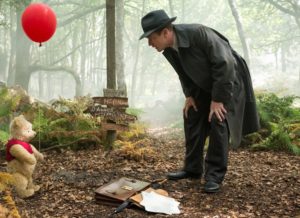 The look of the film itself is very much in the Shepard style, as adapted by the Disney animators all those years ago. There’s a lot of stark color contrast – no levels of grey to indicate the simple way in which Pooh views the world. The design of the trees is also Shepard-like, with lots of soft details. Even the visuals of the London scenes echo Shepard’s illustrations of the city.
The look of the film itself is very much in the Shepard style, as adapted by the Disney animators all those years ago. There’s a lot of stark color contrast – no levels of grey to indicate the simple way in which Pooh views the world. The design of the trees is also Shepard-like, with lots of soft details. Even the visuals of the London scenes echo Shepard’s illustrations of the city.
Marc Forster was an inspired choice to direct this film. The one throughput of his entire filmography is a sense of humanity and sincerity in actors’ performances. Christopher Robin is no exception. Ewan McGregor and Hayley Atwell really shine as Christopher and his wife Evelyn – a couple being split apart by Christopher’s slavish devotion to his job (Christopher thinking he’s doing good while Evelyn thinking he’s not thinking of them – they talk over each other).
The voice talents of the characters all did a marvelous job of emulating the sound and personalities of the voices from the original Disney films. Jim Cummings, who has been voicing Pooh for over 30 years, is a great, familiar vocal bridge to the new story – as is his performance of Tigger, which was just as welcomed. Brad Garrett was the perfect Eeyore in timbre and vocal attitude. Comedian Nick Mohammed had a tall order filling the shoes of John Fiedler as Piglet, but it ended up working out very well and added some more nuance to the character.
The Bad: A Clash of Styles
The tropes of modern filmmaking really took me out of the story because they were so unnecessary in most of the scenes in which they were employed. In certain places, Marc Forster shot this movie like an action film – with lots of jump cuts and shaky cam. Relatively calm scenes had a sense of stressfulness. And I couldn’t really appreciate the amazing effects work with the Pooh characters in some of the shots because the shaky-cam was obscuring them. More long, wide shots would have helped this problem.
This modern style also hindered the film’s pacing. The movie runs at a very brisk clip with few moments for the story to breathe and get the audience to understand what’s going on. Just by the way it all came together tells me that quite a bit of this movie was trimmed. The sequence in which Christopher is working over the weekend, which is intercut with Pooh’s arrival in London, was so quick and overcut that I didn’t really understand the emotional pressure that Christopher was under. Scenes like that need time to get the audience oriented to the world and the action involved. Instead, we’re simply told what’s going on in the most basic way possible.
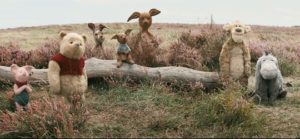
The CGI for the Pooh characters was done very well, for the most part. All of the stuffed characters were quite photorealistic. However, the animation of Pooh was frustrating. In comparison to the other characters, his facial expressiveness was severely limited. He seemed to have an almost constant dead stare even though he had eyelids (we see him sleep a few times) and his ability to show emotion in his brow or mouth is so subtle, one has a hard time seeing it through the fur. It was a shame the emotional heart of the film couldn’t express emotion well.
Doing “Nothing” is Something Eternally
“Doing nothing often leads to the very best of something.”
Winnie the Pooh
The Winnie the Pooh characters have become archetypes of childhood innocence and playfulness. It’s not difficult to understand why these characters have endured over almost a century in the public consciousness. They appeal to that part of us that is full of childlike wonder – things that we often either continue to dwell upon far past the appropriate age or lose completely as we get older.
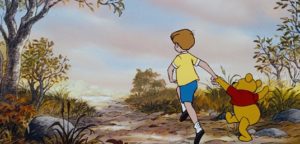 In this film, the grown-up Christopher Robin had a problem with the latter. While his heart was in the right place (providing for his family and setting up his daughter for future success), he lost sight of the importance of play, rest, and the enjoyment of life itself. Both his daughter and his wife suffer from Christopher’s misplaced priorities. They do need to be provided for, but they also need love, time, and attention from him.
In this film, the grown-up Christopher Robin had a problem with the latter. While his heart was in the right place (providing for his family and setting up his daughter for future success), he lost sight of the importance of play, rest, and the enjoyment of life itself. Both his daughter and his wife suffer from Christopher’s misplaced priorities. They do need to be provided for, but they also need love, time, and attention from him.
To Christopher, playing with his daughter fit the worldly definition of doing “nothing” – putting time and energy into something seemingly trivial and unproductive. He kept denying the need for play and wanted her to focus on work because, after all, that’s what he did when he grew up.
With the help of his stuffed friends, Christopher’s eyes were opened and he shared the magic of the Hundred Acre Wood with his family by the end of the film – that long-dormant piece of himself was finally awakened again. This represented his new understanding of what was really important and his newfound ability to balance his adult responsibilities with time playing and doing “nothing” with his family.
In the eyes of an eternal God, this “nothing” is definitely something, and far more important in the grand scheme of things.
“But store up treasures for yourself in heaven, where moths and vermin do not destroy, and where thieves do not break in and steal. For where your treasure is, there your heart will be also.” -Matthew 6:20-21
The “nothing” the Winnie the Pooh and his friends do is the kind of “nothing” that includes spending time with friends and loved ones. In the end, it won’t matter what kind of material work you did in this life. Every material thing we have accumulated and worked for in our lives will eventually turn to dust and be forgotten. What will matter is how we treated those we love – which, according to God, is technically everyone – but especially those close to us.
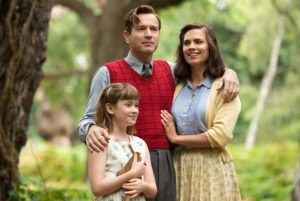
It’s about how we love our spouses and encourage them to become better Christ followers. It’s also about how we raise our children toward the ideal of Jesus, setting them up for their eternal relationship with their Heavenly Father.
Now don’t get me wrong. It’s an important and biblical responsibility for adults to provide for their families. We are not to remain in a state of childish irresponsibility forever, despite what the current culture may encourage. But there must be a balance between the responsibilities and work that comes with adulthood and the time to rest for work and pay attention to the people we love.
A job isn’t something with should get our identity from. Jobs come and go, but the time we spend with people is far more precious. We must do something eternal – raising children, loving people, being good disciples. We must look more to God and trust Him that He will provide us with a way to care for our family. The world may think that is “nothing,” but God doesn’t.
Not letting one’s career define oneself is a concept I have learned slowly over many years. Before I became a Christian, I did define myself by my career. My job was everything and I could never fathom not working for the company I worked for. In the years that have passed since I gave my life to Jesus (almost 15 and counting), God has slowly taken that feeling out of me. Now if I were to lose my job, it would be disappointing, but I don’t see myself falling apart because of it. I love what I do for a living and the company I work for, but it isn’t my entire world. I still struggle, of course, but I have faith that my God will help me.
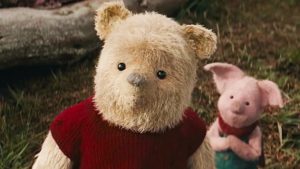 I have a family of my own now. I want to do “nothing” more than anything now – the kind of “nothing” the world defines as such, but God deems as something. I want to be a good disciple of Christ, a good husband, and a good father (God willing) more than anything. Because those are the somethings that matter eternally.
I have a family of my own now. I want to do “nothing” more than anything now – the kind of “nothing” the world defines as such, but God deems as something. I want to be a good disciple of Christ, a good husband, and a good father (God willing) more than anything. Because those are the somethings that matter eternally.
The Final Word
Christopher Robin was a sweet and touching nostalgia trip through the whimsical world of Winnie the Pooh and his friends. While it could be frustrating as a film at times, the story was still quite enjoyable. By the way, if you are looking for a semi-factual look at the true story of the origins of Winnie the Pooh, be sure to check out the exceptional 2017 film, Goodbye Christopher Robin. It actually makes for an interesting companion piece to this film.
We all can sometimes be caught up in the adult responsibilities we all carry in this world. Life can be difficult at times. But we must keep our eye on what is actually important, which includes doing “nothing” with our families. Jobs are important, but they are not as eternally important as the legacy we leave behind for our loved ones. That is definitely something!
